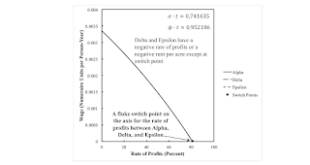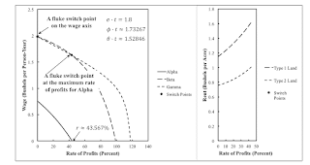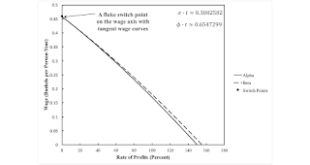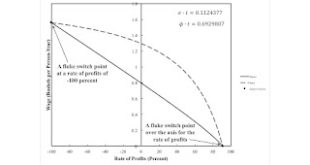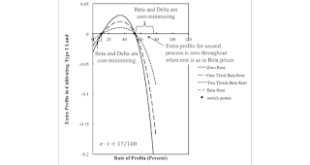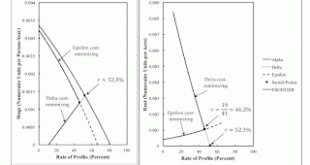Figure 1: Wage Curves and Rent for an Example of Intensive Rent The analysis of the choice of technique has above always been based on the construction of a wage-rate of profits frontier. Given a technology in which requirements for use can be satisfied, prices of production for an eligible technique are uniquely determined by the given rate of profits. If the rate of profits is in a range where such prices are non-negative for at least one technique, one of the techniques is uniquely...
Read More »An Extensive Rent Example
Figure 1: Wage Curves and Rent for an Example of Extensive Rent The analysis of the choice of technique in models of extensive rent can be based on the construction of wage curves, even though the outer envelope does not represent the cost-minimizing technique. The orders of fertility and rentability are emphasized here. The order of fertility is the order in which different qualities of land are introduced into production as requirements for use expand. The order of rentability specifies...
Read More »Fixed Capital And The Emergence Of Reswitching
Figure 1: A Wage Frontier With A Fluke Switch Point A fluke example with fixed capital illustrates the emergence of the reswitching of techniques. Table 1 presents coefficients of production in a perturbation of an example from Schefold (1980). With the first process, workers, under the direction of mangers of firms, manufacture new machines. The remaining two processes are used to produce corn. The last process requires an input of an old machine, which is jointly produced with corn by the...
Read More »The Emergence Of The Reverse Substitution Of Labor
Figure 1: A Wage Frontier With Two Fluke Switch Points This post presents an example with circulating capital alone. Table 1 presents the technology for an economy in which two commodities, iron and corn, are produced. One process is known for producing iron, and two are known for producing corn. Each process is specified by coefficients of production, that is, the required inputs per unit output. The Alpha technique consists of the iron-producing process and the first corn-producing...
Read More »An Indeterminate Solution In An Example Of Extensive Rent
Figure 1: Extra Profits with Given Rent On Type 2 Land1.0 Introduction This post revisits this example of extensive rent. I repeat quite a lot from that post. Prices of production are defined, in models of circulating capital alone, from a given technology, requirements for use, and either the wage or the rate of profits. I usually take requirements for use as given by net output and assume constant returns to scale. Since I am concerned with a choice of technique, I am not disagreeing...
Read More »Reminder: Wages, Employment Not Determined By Supply And Demand For Labor
Figure 1: The Wage as Functions of Employment by Industry1.0 Introduction This post repeats a common theme of mine. It builds on an example I have previously gone on about. I use this example to graph, given the wage, the amount of labor firms would like to employ in each industry, per unit of gross output in each industry. These graphs are derived for an economy in which three commodities are produced: iron, steel, and corn. I also graph the amount of labor firms would like to employ...
Read More »A Theorem For The Reverse Substitution Of Labor
Figure 1: The Wage Frontier for a Numeric Example Theorem: Consider a model of an economy in which n commodities are produced by means of commodities. Let Alpha be a technique in which each of the n commodities is produced by a fixed-coefficients, constant-returns-to-scale process. Suppose the Beta technique differs from Alpha only in the process operated in the nth industry. For simplicity, assume all n commodities are Sraffian basics in both techniques. Let both techniques undergo...
Read More »Variation Of Prices Of Production With Time In An Example Of Intensive Rent
Figure 1: Variation of the Wage Frontier with Technical Progress I continue to explore perturbations of an example from Antonio D'Agata. I have found a new type of fluke switch point, in models of intensive rent. Here I explore structural dynamics along a path in which technical change overwhelms the scarcity of land. In this post, I repeat the data on technology, with a specific parameterization. Table 1 presents the available technology. Iron and steel are produced in processes with...
Read More »A Pattern For Non-Uniqueness
Figure 1: The Wage Frontier And Rent I continue to explore perturbations of an example from Antonio D'Agata. I have found a new type of fluke switch point, in models of intensive rent. In this post, I repeat the data on technology, with a specific parameterization. Table 1 presents the available technology. Corn is grown on homogeneous land, and three processes are available for producing corn. One hundred acres of land are available, leading to the possibility of two processes being...
Read More »A Disconcerting Example of Intensive Rent From D’Agata
Figure 1: The Wage Frontier And Rent1.0 Introduction This post is another worked homework example, problem 7.8 in Chapter 10 of Kurz and Salvadori (1995). The example illustrates the possible non-existence of a cost-minimizing technique with intensive rent. I once looked at an example from J. E. Woods of joint production. I claim that that example does not make the desired point, given the possibility of a price of zero for some produced good. I do not think this example of rent can be...
Read More » Heterodox
Heterodox

